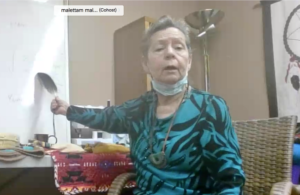Fort William First Nation Elder inspires during Dibaajimowin Anishinaabe Storytelling series

By Rick Garrick
FORT WILLIAM FIRST NATION — Fort William First Nation Elder Rita Fenton shared her life story from growing up on the land to completing her Masters of Social Work Degree at 69-years-old during the Dibaajimowin Anishinaabe Storytelling series.
“I told my life story around the Medicine Wheel,” Fenton says during her Dec. 16 virtual presentation on Life Stages of the Medicine Wheel. “There were over 60 participants that were signing in — they really enjoyed it.”
Fenton began her story by sharing how her family lived on the land without running water or electricity when she was a child.
“We lived off the land and we got everything provided by the land,” Fenton says. “My dad was a hunter, a fisherman and a trapper. And he got medicines from the trees, from the ground.”
Fenton then spoke about leaving home at 17-years-old, getting married and giving birth to her son during her youth stage of life.
“I had my son when I was 18, so I was very young myself,” Fenton says. “We moved around because my ex was a hockey player. I got heavy into my addiction with alcohol and in my adult life in my 30s, that’s when I hit a bottom with alcohol and I knew I wanted a better life for my children so that’s when I went for help.”
Fenton says her life changed when she went for counselling during her adult life.
“That changed my whole life around because I didn’t know how to live without alcohol,” Fenton says. “I suppressed all my feelings from my childhood and I had no identity because of the Indian Act because of the discrimination about [Indigenous] women [who married non-(Indigenous) men]. I had no identity because I was trying to fit in but I didn’t fit in anywhere.”
Fenton says she began learning about First Nation history in 1983-84 when she went to college and studied with the late Walter Linklater.
“That’s when I started to learn about culture, about teachings and the pow wows and the different ways our people lived a long time ago, and started learning about the history of residential schools and the Sixties Scoop and the Indian Act,” Fenton says. “I was ignorant myself and hence I had no identity — I didn’t know who I was, I was lost for many years.”
Fenton says she began studying at Lakehead University in her late 40s and graduated with her Honours Bachelor of Social Work Degree in 2001.
“It wasn’t until 2016 that I went to Wilfrid Laurier University and graduated with my Masters in Social Work at the age of 69,” Fenton says. “I work all over the north. I registered with Matawa (First Nations Management) and Nishnawbe Aski Nation and whenever there was a crisis they would call me and they would fly me wherever there was a crisis.”
Fenton says she also gets calls to serve as an Elder from a range of organizations, including the Chiefs of Ontario.
“I feel it is important to share the teachings with others,” Fenton says. “People may relate to my stories because experience is the best teacher that I have found. My parents were educated from the land, from the trees, the water and the seasons. And what I learned, that’s what I feel I have to pass on for future generations, my grandchildren, my great grandchildren and Indigenous people in general and even non-Indigenous people.”
The Dibaajimowin Anishinaabe Storytelling series was presented by St. Joseph’s Care Group in Thunder Bay with Elders Gerry Baxter, Ma-Nee Chacaby, Luke Sagutch and Audrey Deroy also delivering virtual presentations.


